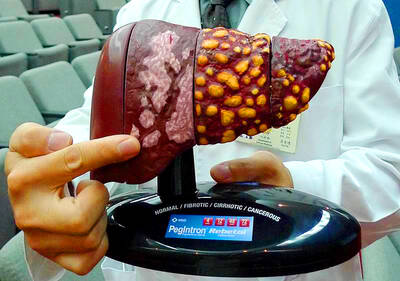An Indian firm in Taipei is embroiled in a court battle with the residents of an apartment building who accuse the company of operating a religious shrine in the building and demand that the shrine be removed, reports said yesterday.
The Chinese-language Liberty Times (the Taipei Times’ sister paper), said the firm bought an apartment on the top floor of a 20-story building on Dunhua S Road to install a Jain temple.
The temple attracts Indian residents of Taipei, who pray at the shrine, disturbing the building’s residents, the paper said.
The building’s visitor registry indicated that on Sunday, 16 people visited the shrine, cable TV channel ETTV said.
“Once a year there is a big celebration, when some 100 Indians visit the shrine to pray,” the channel said.
In January, the management committee of the building asked the firm to move out, saying that religious activities are not allowed inside residential buildings.
When the company refused, the committee filed a lawsuit at Taipei District Court to evict the firm.
The firm said it was not maintaining a shrine in the building, and further argued that some families in the building have Buddhist or Taoist shrines in their homes.
It said it bought the apartment to house company employees on business trips to Taiwan.
“We have been trying to settle this peacefully with the residents, but have not succeeded yet,” said Wang Ho-ping (王和屏), the lawyer for the company.
The law protects religious freedom, but requires that religious organizations register with the Ministry of the Interior.
However, legislation governing the management of apartment buildings stipulates that residents should not disturb the peace or adversely affect safety and hygiene in an apartment building.
Approximately 2,000 Indian expatriates, mostly businesspeople and their families, live in Taiwan.
Jainism is an ancient religion that prescribes non-violence and the development of spirituality through reliance on one’s own wisdom and self-discipline.

Aftershocks from a magnitude 6.2 earthquake that struck off Yilan County at 3:45pm yesterday could reach a magnitude of 5 to 5.5, the Central Weather Administration (CWA) said. Seismological Center technical officer Chiu Chun-ta (邱俊達) told a news conference that the epicenter of the temblor was more than 100km from Taiwan. Although predicted to measure between magnitude 5 and 5.5, the aftershocks would reach an intensity of 1 on Taiwan’s 7-tier scale, which gauges the actual effect of an earthquake, he said. The earthquake lasted longer in Taipei because the city is in a basin, he said. The quake’s epicenter was about 128.9km east-southeast

The Taipei Summer Festival is to begin tomorrow at Dadaocheng Wharf (大稻埕), featuring four themed firework shows and five live music performances throughout the month, the Taipei Department of Information and Tourism said today. The festival in the city’s Datong District (大同) is to run until Aug. 30, holding firework displays on Wednesdays and the final Saturday of the event. The first show is scheduled for tomorrow, followed by Aug. 13, 20 and 30. To celebrate the 30th anniversary of Disney Pixar's movie Toy Story, the festival has partnered with Walt Disney Co (Taiwan) to host a special themed area on

BE CAREFUL: The virus rarely causes severe illness or death, but newborns, older people and those with medical conditions are at risk of more severe illness As more than 7,000 cases of chikungunya fever have been reported in China’s Guangdong Province this year, including 2,892 new cases last week, the Centers for Disease Control (CDC) yesterday said it is monitoring the situation and considering raising the travel notice level, which might be announced today. The CDC issued a level 1 travel notice, or “watch,” for Guangdong Province on July 22, citing an outbreak in Foshan, a manufacturing hub in the south of the province, that was reported early last month. Between July 27 and Saturday, the province reported 2,892 new cases of chikungunya, reaching a total of 7,716

STAY VIGILANT: People should reduce the risk of chronic liver inflammation by avoiding excessive alcohol consumption, smoking and eating pickled foods, the physician said A doctor last week urged people to look for five key warning signs of acute liver failure after popular producer-turned-entertainer Shen Yu-lin (沈玉琳) was reportedly admitted to an intensive care unit for fulminant hepatitis. Fulminant hepatitis is the rapid and massive death of liver cells, impairing the organ’s detoxification, metabolic, protein synthesis and bile production functions, which if left untreated has a mortality rate as high as 80 percent, according to the Web site of Advancing Clinical Treatment of Liver Disease, an international organization focused on liver disease prevention and treatment. People with hepatitis B or C are at higher risk of